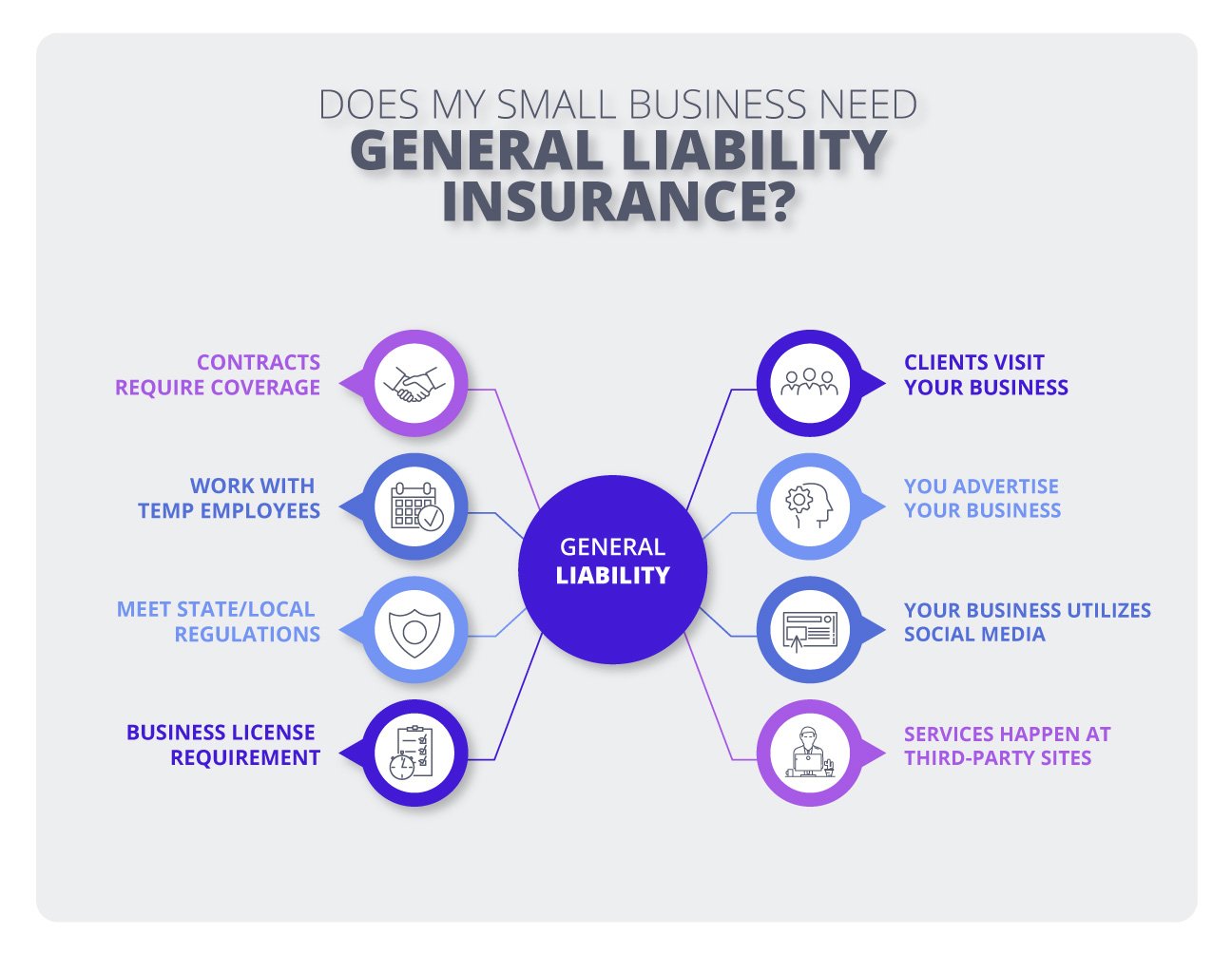
General liability insurance
General liability insurance
General liability insurance covers common risks like customer injuries, customer property damage, and advertising injuries. It protects your business from the high costs of lawsuits and helps you qualify for leases and contracts.
Why is general liability insurance important for small businesses?
General liability insurance protects against the most common risks of running a business. It's typically the first policy purchased by small business owners.
This type of business liability insurance provides financial protection if a customer slips and suffers an injury at your business, or if you accidentally damage someone's property. This policy also covers personal and advertising injuries, such as libel and copyright infringement.
Small business owners often need general liability insurance to fulfill requirements for a lease, loan, or contract. For example, a landlord might ask to see a certificate of insurance when you sign a commercial lease.
General liability coverage is a crucial component of risk management for small businesses, and it's affordable. The average premium is only $42 per month for Insureon customers.

General liability coverage is essential if your business:
- Has a location that is open to the public
- Works closely with customers or clients
- Handles client property
- Rents or owns commercial property
- Advertises its services in print or online
What does general liability insurance cover?
General liability insurance provides coverage for common liability claims from third parties (people outside your business).
This business insurance policy covers legal defense costs if someone sues over a bodily injury, property damage, or advertising injury. Your policy can pay for everything from hiring a lawyer to court-ordered judgments and settlements, and may include specialized forms such as railroad protective liability insurance.
Specifically, your commercial general liability (CGL) policy provides coverage for:
Third-party bodily injuries
If a customer is hurt in an accident at your business, general liability insurance can help pay for medical expenses. It also covers legal expenses if a customer sues over their injury.
Third-party property damage
A general liability insurance policy can cover expenses when your business accidentally damages or destroys another person’s property.
Product liability
Not all property damage or customer injuries happen on your premises. If a business manufactures, distributes, or sells products, it can be sued over the harm its products cause to people or property.
Most commercial general liability (CGL) policies include product liability insurance. This type of coverage helps pay for lawsuits and other financial losses related to defective products, food contamination, labeling errors that harm customers, and other product risks.
Personal injuries and advertising injuries
If someone sues a business owner or employee over slander, libel, false advertising, invasion of privacy, or copyright infringement, general liability insurance can help pay for legal defense costs and any resulting settlement or judgment.
How much does general liability insurance cost?

General liability insurance costs an average of $42 per month for Insureon's small business customers. And 29% pay less than $30 per month for their policies.
The cost of general liability insurance is different for every business. Insurers look at several factors when calculating your premium, such as:
- Industry and risk factors
- Location
- Number of employees
- Coverage limits
- Claims history
Verified general liability coverage reviews
Who needs general liability insurance?
Most small businesses need general liability insurance, especially if you have a storefront or an office that's open to the public. Any business that interacts with clients and customers will benefit from this coverage.
That's true even if you work from home, as homeowner's insurance won't cover business-related claims, such as a delivery person who slips on an icy front step. If your business has a website, posts on social media, or advertises in print or online, then you should carry it for protection against advertising injuries and copyright infringement.
A general liability policy can keep your company financially stable if you’re sued by a customer, competitor, or other third party. Because general liability insurance provides such important coverage, most small business owners buy this policy right after they start their business.

Is general liability insurance required by law?
Generally not, but states may mandate it for certain industries like construction and cannabis. Depending on your type of business, you may also need coverage to get a professional license in your state.
While commercial general liability (CGL) insurance isn’t typically required by law, it’s still likely required by your landlord, mortgage company, business partners, or clients. For example, Amazon sellers are required to carry coverage when their sales reach a certain threshold.
A landlord or client may ask your business to show an ACORD certificate of insurance as proof of your general liability insurance coverage. This document verifies that your business can handle any personal injury or property damage lawsuits.
Most importantly, the certificate gives your property manager, bank, or customer peace of mind that they won’t be stuck paying the costs of a lawsuit against your company.
Do independent contractors need general liability insurance?
Like any small business owner, independent contractors and even subcontractors can be sued and held liable for customer injuries, customer property damage, or advertising injuries.
While contractors who don’t have a physical location or expensive equipment probably don’t need a business owner’s policy (BOP) or commercial property insurance, they will still benefit from general liability insurance.
If you don’t want to purchase a commercial general liability (CGL) policy, you can ask your clients to add you to their policies as an additional insured. This will cover you for as long as you work for the client who insures you.
Keep in mind that your clients might pay a higher insurance premium if they add you to their general liability policies, and your coverage will end once the contract expires.
In addition to carrying general liability coverage for themselves, construction contractors should also consider buying owners and contractors protective (OCP) liability insurance to protect project owners and help them win contracts.
Do I need general liability insurance for my LLC?
Yes. Even though a limited liability company (LLC) protects your personal assets, you still need general liability insurance to protect your business.
A slip-and-fall injury or a dropped laptop could financially devastate your business if the customer sues. That's especially true for smaller LLCs that don't have a lot of resources to draw upon during a lawsuit.
As with other types of businesses, you might need general liability coverage and other LLC insurance policies to sign leases and contracts, or fulfill other requirements.
How do I get proof of general liability insurance?
Hey there! Yeah, up here in the corner. Good news: You've purchased your policy to protect your business! But that's only the beginning...
A licensed expert will email you a certificate of insurance the day you buy a policy. I'd do it, but, you know, I'm an animated talking head.
The certificate means peace of mind. And you can access it on the Insureon online customer portal where you can review policy info and all of your insurance documentation.
Need additional assistance? Or want to make changes? Yeah, no problem! Call toll free, or reach out to a dedicated account manager with questions about billing and claims.
We're with you now, and as you grow. Behind the scenes, but there when you need us. Insureon. Protection is peace of mind.
You can usually get proof of insurance online the same day you apply for quotes with Insureon.
Traditional insurance agents can take several weeks to send a certificate of general liability insurance to new customers, which could be an issue for a policyholder who needs immediate proof of insurance to sign a pending contract or lease.
To get coverage quickly, fill out Insureon’s free online application. You’ll need to provide basic information about your business, such as:
- Business name
- Business operations
- Number of employees
- Estimated annual revenue
- Years of industry experience
What does general liability insurance not cover?
While general liability insurance is crucial for most small businesses, it does not provide all the protection you need. For instance, your policy does not include coverage for:
Professional mistakes and breach of contract
Professional liability insurance covers lawsuits related to professional negligence. That includes undelivered services, missed deadlines, breach of contract, and other errors and oversights.
This policy is crucial across many professions, including architects, consultants, interior designers, real estate professionals, tax preparers, and more. In other fields, you might see it referred to as errors and omissions insurance (E&O) or malpractice insurance.
Employee injuries
Workers' compensation insurance is the policy that covers medical expenses and disability benefits for employees who are injured on the job. It's required in most states for businesses that have employees.
Labor-intensive businesses depend on this policy, but it's also beneficial for accounting firms, computer repair professionals, house cleaners, photographers, and more. Even sole proprietors benefit from coverage, as personal health insurance can deny claims when an injury is related to your job.
Business property damage and theft
A business owner's policy helps pay for replacement of stolen business property. It also covers business property damaged by a fire or certain weather events.
This bundle combines general liability insurance with commercial property insurance at a discount. It's ideal for low-risk businesses such as advertising agencies, churches and religious organizations, day spas, insurance agents, and more.
Similar to a BOP, a commercial package policy (CPP) also includes these coverages, but it's generally purchased by high-risk small and medium-sized businesses. With broad underwriting and customizable limits, a CPP allows business owners to address the specific risks they face with the right amount of coverage.
Businesses that don't own or rent a building can add a business personal property (BPP) endorsement to their general liability policy. It covers your computers, tools, inventory, and furniture.
Additionally, a builder's risk policy provides coverage for a structure in progress and materials at a construction site, which isn't covered by standard general liability insurance. It can help pay for repairs and debris removal in the event of a fire or non-severe weather event, or cover lumber or copper wire stolen from a worksite.
Employee discrimination lawsuits
Employment practices liability insurance (EPLI) can cover legal expenses related to employee claims of harassment, discrimination, and wrongful termination. Good candidates for EPLI coverage include retailers, food and beverage businesses, manufacturers, and healthcare professionals.
Vehicles used by a business
Personal auto insurance policies almost always exclude business use, outside of your commute.
Most states require that vehicles owned by a business have commercial auto insurance. The amount of auto liability insurance you need also depends on state laws.
Industries that often buy commercial auto insurance for their vehicles include construction and installation, cleaning, and landscaping.
Personal, leased, and rented vehicles used for work purposes can be covered by hired and non-owned auto insurance (HNOA), which you can add to a general liability policy.
Liquor liability
Liquor liability insurance covers legal fees from incidents involving people who became intoxicated at your business. That could include drunk driving, assault, and vandalism.
This policy is often required for businesses that sell or serve alcohol. You can purchase it as a standalone policy or add it to your general liability policy. A few professions in particular that should carry this coverage are restaurants, food trucks, convenience stores, and bars.
Workers’ compensation insurance
Professional liability insurance
Cyber insurance
Commercial property insurance
Commercial umbrella insurance

FAQs about general liability insurance
Review answers to frequently asked questions about general liability insurance coverage.
How much general liability coverage do I need?
If you are purchasing general liability insurance to fulfill the terms of a contract or lease, you need to make sure that your coverage meets the requested policy limits.
Otherwise, you should aim for an amount of coverage that's both affordable and matches your business needs. Simply put, you want to make sure your policy can pay for a lawsuit if you’re sued. Consider the size of your business, the number of employees, and your business operations to determine your exposures and risk of financial loss.
Most small businesses opt for the standard $1 million per occurrence / $2 million aggregate policy limits. This means the policy will pay up to $1 million to cover a single incident, with a $2 million limit for the policy period, typically one year.
If your business has high risks or a contractual requirement for higher limits, you can extend your general liability insurance coverage with commercial umbrella insurance. Umbrella insurance increases your maximum policy limit, meaning your insurance company can cover more expensive lawsuits.
When buying a policy, make sure the deductible is something you can easily afford. If you can’t pay for it in a crisis, your insurance won’t activate to cover your liability claim.
What is the difference between general liability and professional liability insurance?
General liability covers customer injuries, customer property damage, and advertising injuries. Professional liability insurance covers disputes over the quality of your professional services.
Almost all businesses need general liability insurance, but businesses that provide professional services need added protection from mistakes and unhappy clients.
That’s where professional liability coverage comes in. This policy helps professionals like accountants, lawyers, consultants, and insurance agents avoid high costs from lawsuits related to the quality of their work.
For some industries, such as media and advertising, general liability insurance will not cover libel, slander, or other advertising injuries. These businesses instead require media liability insurance, which is a form of professional liability insurance.
Read more about general liability vs. professional liability insurance.
What are general liability insurance exclusions?
General liability insurance has several coverage exclusions. For instance, it won't cover intentional injuries or property damage—which can be criminal offenses. It also doesn't cover intentional copyright infringement or willful negligence.
While a general liability policy typically covers damage to someone else’s property, most policies exclude times when you have temporary possession of the items or you've been entrusted with their care. In insurance terms, this is called care, custody, and control.
You can fill this gap with bailee coverage, which is a type of inland marine insurance that can complement both general liability and commercial property coverage.
Other common exclusions include pollution, data breaches, and injuries sustained by an employee of a subcontractor (also called an action over exclusion).
Read your policy carefully to see what is and isn't covered. To fill other gaps in coverage, you can add endorsements to your policy. Check with a licensed insurance agent to make sure your general liability policy includes all the coverage you need.
What is coverage A, B, and C for commercial general liability insurance?
There are three liability categories included in a general liability policy, which was formerly called public liability insurance:
Coverage A: Bodily injury and property damage liability
This insures against claims that your business caused a bodily injury or property damage to other people and their belongings. Examples include:
- A customer injures themselves after accidentally slipping and falling at your business.
- An employee accidentally damages a customer's property.
- A customer claims that one of your products caused them a physical injury.
Coverage B: Personal and advertising injury
This includes claims of defamation, copyright violations, and invasion of privacy. For example:
- A rival business or individual accuses you of libel or slander in an advertisement, website, or social media post.
- Another business sues you for alleged copyright or trademark infringement.
- A customer accuses your business of violating their privacy by disclosing their personal information without their consent.
Coverage C: Medical payments
Coverage C pays for the medical expenses of non-employees who are injured at your business. It’s known as “no-fault” insurance, because it covers the injured person’s medical bills with no need for determining who was at fault, and without going to court.
The biggest difference between A, B, and C coverages is that A and B include legal expenses. Coverage C does not pay for your legal costs, because it covers claims on a "no-fault" basis.
Where can I learn more about general liability insurance?
If you want to learn more about this policy, you can find additional answers in our frequently asked questions about general liability insurance.
If you have any other questions about coverage or other types of business insurance you may need, such as workers' comp or a business owner's policy, you can also contact an Insureon agent.
Obtén más información sobre el seguro de responsabilidad civil general (en español).































